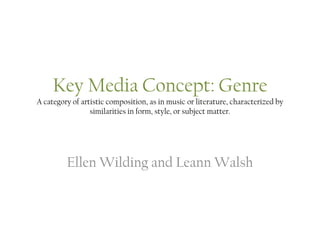
Genre
- 1. Key Media Concept: GenreA category of artistic composition, as in music or literature, characterized by similarities in form, style, or subject matter. Ellen Wilding and Leann Walsh
- 2. What is genre? www.mediaknowall.comdefines ‘genre’ as… A text is classified in a genre through the identification of key elements which occur in that text and in others of the same genre. These elements may be referred to as paradigms, and range from costume to music to plot points to font (depending on the medium). Audiences recognise these paradigms, and bring a set of expectations to their reading of the text accordingly: the criminal will be brought to justice at the end of the police thriller. These paradigms may be grouped into those relating to iconography (ie the main signs and symbols that you see/hear), structure (the way a text is put together and the shape it takes) and theme (the issues and ideas it deals with).
- 3. What do genres mean for audiences? Audiences... - can select texts based on their genre, and they are often sold in these categories, both in shops or on websites. Also, certain genres are considered more appropriate for certain sections in society, e.g. ‘chick flicks’ are aimed at teenage girls - have expectations about a text based on its genre, allowing them to draw pleasures from its conventions, such as repeated narratives (e.g. knowing that justice will be served at the end of a crime movie) However, pleasure can also be drawn from differences - identify with repeated elements in generic texts and may shape their own identity in response (e.g.fans of a particular genre of music dress in a specific way)
- 4. What do genres mean for producers? Producers… - market texts according to genre because an audience of fans of that genre has already been established - standardiseproduction practices according to genre conventions, thus cutting costs - subscribe to established conventions of verisimilitude, thus reinforcing genre conventions, but also allowing creativity within a given format e.g. it is an accepted convention in science fiction that spaceships make noises, which helps create excitement in battle scenes, but it is a scientific fact that sound doesn’t travel through space
- 5. Steve Neale ‘Genres are instances of repetition and difference' (Neale 1980, 48). He adds that 'difference is absolutely essential to the economy of genre' (ibid., 50): mere repetition would not attract an audience. “Genres are not seen as forms of textual codifications, but between industry, text, and subject”
- 6. Tom Ryall’s Triangle Ryall agreed with the idea of genre being “between industry, text and subject”, and developed this model as a way of analysing genre, claiming that you cannot watch a film without considering these elements:
- 7. David Bordwell David Bordwellclaims that themes are an inadequate way of defining genre as “any theme may appear in any genre.” He asks: “Are animation and documentary films genres or modes? Is the filmed play or comedy performance a genre? If tragedy and comedy are genres, perhaps then domestic tragedy or slapstick is a formula.” Additionally, he offers a useful inventory of categories used in film criticism… “Grouping by period or country (American films of the 1930s), by director or star or producer or writer or studio, by technical process (CinemaScope films), by cycle (the 'fallen women' films), by series (the 007 movies), by style (German Expressionism), by structure (narrative), by ideology (Reaganite cinema), by venue ('drive-in movies'), by purpose (home movies), by audience ('teenpix'), by subject or theme (family film, paranoid-politics movies).” (Bordwell 1989, 148)
- 8. Robert Stam Theorist Robert Stam came up with his own list of ways that films are commonly categorised... “While some genres are based on story content (the war film), other are borrowed from literature (comedy, melodrama) or from other media (the musical). Some are performer-based (the Astaire-Rogers films) or budget-based (blockbusters), while others are based on artistic status (the art film), racial identity (Black cinema), location (the Western) or sexual orientation (Queer cinema).”